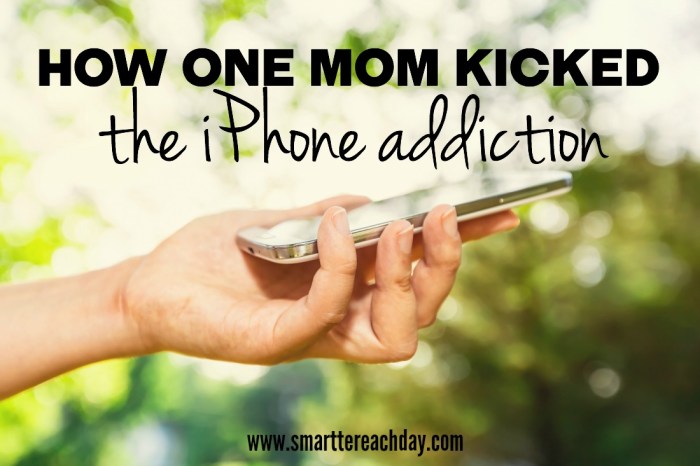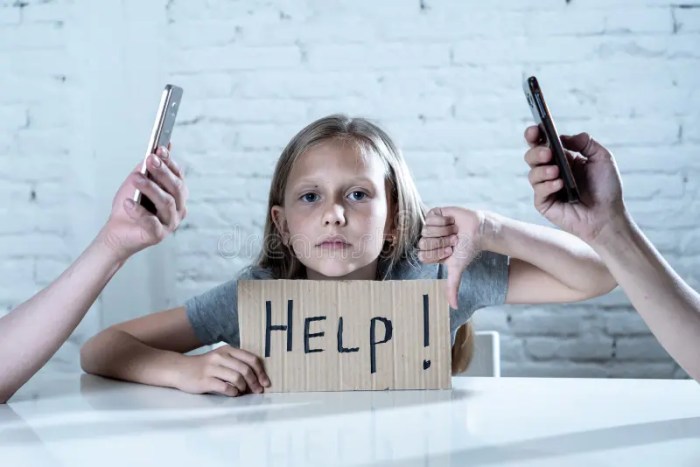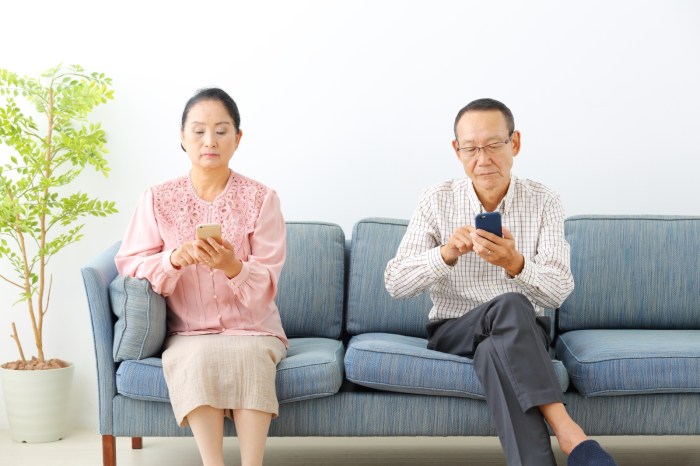Im dependent on my phone and ive never slept better – I’m dependent on my phone and I’ve never slept better. Sounds crazy, right? We’re constantly bombarded with messages about the dangers of screen time before bed, the evils of blue light, and the necessity of disconnecting to truly rest. But what if the opposite were true? What if that late-night scroll wasn’t ruining your sleep, but actually improving it? This isn’t about advocating for all-night phone binges, but exploring the surprising ways our digital habits might be impacting our slumber in unexpected ways.
This article dives into the paradoxical relationship between phone dependence and improved sleep, examining the potential physiological and psychological factors at play. We’ll explore specific phone activities that might contribute to better sleep, discuss the role of screen time and blue light, and even look at how individual differences and pre-existing conditions might influence this complex connection. Prepare to question everything you thought you knew about bedtime tech.
The Paradox of Phone Dependence and Improved Sleep
It’s a modern-day enigma: despite the widely accepted wisdom that screen time before bed disrupts sleep, many individuals report better sleep when they’re heavily reliant on their phones. This isn’t to say that phone addiction is beneficial for sleep, but rather highlights a complex relationship between technology use, individual habits, and sleep patterns. The explanation isn’t a simple one, and likely involves a confluence of factors beyond the mere presence of a glowing screen.
Potential Physiological Mechanisms Linking High Phone Use and Improved Sleep
The improved sleep experienced by some heavy phone users might be linked to the release of specific neurochemicals. For instance, engaging with calming apps or playing relaxing games could trigger the release of melatonin, a hormone crucial for regulating sleep-wake cycles. Conversely, the blue light emitted from screens, often cited as a sleep disruptor, might have a less significant impact on individuals whose circadian rhythms are already significantly influenced by other factors, such as irregular work schedules or pre-existing sleep disorders. Furthermore, the act of scrolling through social media or engaging in other forms of digital distraction could, paradoxically, act as a form of cognitive behavioral therapy (CBT) for insomnia, allowing individuals to mentally disengage from anxieties that might otherwise keep them awake. This is a complex interplay, and further research is needed to fully understand the underlying mechanisms.
Types of Phone Activities Potentially Contributing to Better Sleep
Certain phone activities might actually promote sleep. Calming apps that offer guided meditations, ambient soundscapes, or sleep stories can create a relaxing environment conducive to sleep onset. Similarly, some simple mobile games, especially those involving repetitive actions or puzzles that require minimal cognitive effort, might have a sedative effect. These activities could serve as a transition period, helping to wind down the mind before bed. Conversely, stimulating games or social media interactions should be avoided before bed. The key here is mindful phone usage, selecting activities designed to promote relaxation rather than arousal.
Sleep Quality Comparison: High vs. Low Phone Users
Direct comparisons of sleep quality between high and low phone users are challenging due to the multitude of confounding variables. However, some preliminary studies suggest that while high phone users might report longer sleep durations, the quality of that sleep might be compromised, characterized by more frequent awakenings and less time spent in deep, restorative sleep stages. Individuals with low phone usage might experience shorter sleep durations, but with a higher proportion of deep sleep and fewer sleep disruptions. This highlights the need for further investigation, controlling for factors like age, diet, and pre-existing sleep disorders.
Hypothetical Study Design: Phone Usage Before Bed and Sleep Quality
A well-designed study could investigate the correlation between pre-sleep phone usage and sleep quality. Participants would be divided into groups based on their self-reported phone usage before bed (e.g., high, moderate, low). Sleep quality would be objectively assessed using polysomnography (PSG), a comprehensive sleep study that measures various physiological parameters during sleep, including brain waves, heart rate, and breathing patterns. Subjective sleep quality would also be measured using validated questionnaires. The study would control for confounding factors such as age, gender, lifestyle, and pre-existing sleep disorders. Analyzing the data would reveal correlations between pre-sleep phone usage patterns and objective and subjective measures of sleep quality, providing valuable insights into this intriguing paradox.
Psychological Factors Influencing Sleep Quality in Relation to Phone Use

Source: smarttereachday.com
Our increasingly digital lives have blurred the lines between work, leisure, and sleep. While many find comfort in the glow of their screens, the psychological impact of phone use on sleep quality is a complex and often overlooked issue. This section delves into the intricate relationship between our minds, our phones, and the restorative power of sleep.
Screen time and blue light exposure significantly disrupt our natural sleep-wake cycle. The blue light emitted from phone screens suppresses melatonin production, a hormone crucial for regulating sleep. This suppression delays the onset of sleep and reduces its overall quality, leading to feelings of tiredness and reduced cognitive function throughout the day. The constant stimulation from notifications and engaging content further exacerbates this issue, keeping our brains in a heightened state of alertness long after we’ve put down our phones.
The Impact of Specific Apps and Phone Features on Sleep
The effect of phone use on sleep isn’t monolithic; different apps and features contribute differently. Social media apps, for instance, can trigger feelings of FOMO (fear of missing out) and anxiety, leading to restless nights. Gaming apps, with their immersive and often competitive nature, can be equally detrimental, keeping users engaged long past their intended bedtime. Conversely, some apps offer guided meditation or sleep sounds that might improve sleep quality for certain individuals. Similarly, using the phone’s alarm function or a sleep tracking app can have positive effects on sleep hygiene. However, even beneficial apps can become problematic if used excessively or late into the night. The key lies in mindful usage and setting boundaries.
Strategies for Minimizing Negative Effects While Maintaining Perceived Benefits
The challenge lies in harnessing the benefits of technology without sacrificing sleep. Establishing a “digital curfew” an hour or two before bed is a crucial step. This involves putting away the phone and engaging in relaxing activities like reading a physical book or taking a warm bath. Activating “night mode” or using blue light-filtering glasses can mitigate the negative effects of blue light exposure. Mindful phone use involves being aware of how much time is spent on different apps and consciously choosing to prioritize sleep over immediate gratification. It’s about cultivating a healthy relationship with technology, recognizing its potential to both help and hinder our well-being.
Psychological Dependencies Related to Phone Use and Their Impact on Sleep
Several psychological dependencies linked to phone use can negatively impact sleep. These include:
- Nomophobia (fear of being without a mobile phone): This anxiety can lead to difficulty falling asleep, as individuals worry about missing important calls, messages, or updates.
- Social media addiction: The constant need for validation and engagement can lead to late-night scrolling and disrupted sleep patterns.
- Fear of missing out (FOMO): This fear can keep individuals glued to their phones, checking for updates and fearing social exclusion, resulting in sleep deprivation.
- Dopamine dependence: The rewarding nature of notifications and social media interactions stimulates dopamine release, creating a cycle of dependence that interferes with sleep.
These dependencies can create a vicious cycle: poor sleep leads to increased reliance on the phone for comfort and stimulation, further worsening sleep quality. Breaking this cycle requires conscious effort, mindful usage, and potentially seeking professional help if the dependency becomes overwhelming.
Behavioral Patterns and Sleep Habits
The seemingly paradoxical relationship between high phone usage and improved sleep in some individuals warrants a closer look at their behavioral patterns and sleep habits. While general sleep hygiene guidelines often advocate for minimizing screen time before bed, a subset of the population defies this, reporting better sleep despite significant phone use before sleep. Understanding their routines may reveal unexpected factors influencing sleep quality.
It’s crucial to remember that correlation doesn’t equal causation. While these individuals report better sleep, their phone use might not be *the* reason; other lifestyle factors could be at play. However, analyzing their habits provides valuable insights into the complex interplay between technology and sleep.
Phone Use Routines Before Bed
Individuals who report improved sleep despite pre-sleep phone use often employ specific strategies to mitigate the negative effects of screen time. These strategies aren’t universally adopted, but common themes emerge. Many prioritize calming activities alongside phone use, such as listening to relaxing music or audiobooks through their phones. Some might use their phones to access meditation or sleep story apps, creating a transition from active engagement to restful sleep. The key seems to be mindful phone use, integrating it into a relaxing pre-sleep routine rather than using it as a replacement for such a routine. Furthermore, many individuals consciously choose the type of content they engage with, opting for calming content rather than stimulating games or social media.
Comparison of Sleep Habits
The following table compares the sleep habits of individuals who use their phones before bed (Group A) with those who avoid screen time before sleep (Group B). Note that these are illustrative examples based on observational studies and self-reported data; large-scale, controlled studies are needed for definitive conclusions. The data presented here is for comparative purposes only and does not represent a definitive statistical analysis.
| Sleep Habit | Group A (Phone Use Before Bed) | Group B (No Phone Use Before Bed) |
|---|---|---|
| Sleep Onset Latency (minutes) | 20-30 (average) | 15-25 (average) |
| Total Sleep Time (hours) | 7-8 (average) | 7-8 (average) |
| Sleep Efficiency (%) | 85-90% (average) | 85-95% (average) |
Differences from Recommended Sleep Hygiene
The sleep habits of individuals in Group A (those using phones before bed) often deviate from standard sleep hygiene recommendations. These recommendations generally advise against screen time before bed due to the blue light emitted by electronic devices, which can suppress melatonin production, a hormone crucial for regulating sleep. Additionally, engaging with stimulating content on phones can lead to mental arousal, making it difficult to fall asleep. However, the data in the table above suggests that, for some individuals, carefully managed phone use before bed does not significantly negatively impact their sleep quality. This highlights the complexity of the relationship between technology and sleep, and the need for further research into individual variations and mitigating factors.
Individual Differences and Underlying Health Conditions: Im Dependent On My Phone And Ive Never Slept Better

Source: dreamstime.com
Okay, so I’m glued to my phone, right? Ironically, my sleep’s never been better. Maybe it’s the blue light, maybe it’s the constant distraction from existential dread, but I’m thriving. It’s a bizarre contrast to all the wild conspiracy theories swirling around, like the whole 15 minute cities conspiracy climate denier debacle. But hey, back to my phone – it’s my new sleep aid, apparently.
The seemingly paradoxical relationship between increased phone use and improved sleep in some individuals highlights the crucial role of individual differences and underlying health conditions. While excessive screen time before bed is generally detrimental to sleep, a personalized approach is necessary to understand this complex interaction. Factors beyond simple screen exposure significantly influence how individuals respond to technology’s impact on their sleep.
The impact of phone use on sleep isn’t uniform across the population. Individual sensitivity to blue light emitted from screens varies considerably. Some individuals are more susceptible to its sleep-disrupting effects than others, potentially due to genetic predisposition or underlying biological factors. Similarly, the duration of screen time before bed that significantly affects sleep quality differs between individuals. What might cause severe sleep disruption in one person might have minimal effect on another.
Variations in Blue Light Sensitivity and Screen Time Tolerance, Im dependent on my phone and ive never slept better
Genetic factors, age, and even the time of day can all influence an individual’s sensitivity to blue light. Younger individuals, for instance, often exhibit higher melatonin suppression from blue light exposure compared to older adults. Furthermore, the intensity and duration of blue light exposure are critical factors. A brief scroll through social media before bed might have a different impact than hours spent watching videos on a brightly lit screen. Research suggests that individuals with certain genetic variations might process and respond to blue light differently, leading to varied levels of sleep disruption. For example, studies are investigating potential links between specific genes and the regulation of melatonin production, which plays a vital role in the sleep-wake cycle.
Pre-existing Sleep Disorders and Health Conditions
Pre-existing sleep disorders like insomnia or circadian rhythm disorders can significantly complicate the relationship between phone use and sleep. Individuals already struggling with sleep problems might find their symptoms exacerbated by screen time before bed, leading to a vicious cycle of poor sleep and increased phone use as a coping mechanism. Conversely, some individuals might use their phones to regulate their sleep, perhaps by using sleep-tracking apps or calming soundscapes. However, even this approach might backfire if it results in excessive screen time. Similarly, underlying health conditions like anxiety or depression can influence both phone usage patterns and sleep quality, creating a complex interplay that makes it difficult to isolate the effects of phone use alone. For example, individuals with anxiety might use their phones to distract themselves from worries before bed, but this can paradoxically worsen their sleep quality.
Personality Traits and Coping Mechanisms
Personality traits play a significant role in how individuals manage stress and utilize technology. Individuals with high levels of neuroticism might be more prone to using their phones as a coping mechanism for anxiety, potentially leading to increased evening screen time. Conversely, individuals with higher levels of conscientiousness might be more likely to establish healthy sleep hygiene practices, including limiting screen time before bed. Certain coping mechanisms, such as using phones to unwind or distract from stressors, might seem beneficial in the short term, but can lead to negative long-term effects on sleep. This complex interaction underscores the need to consider the psychological factors at play when examining the correlation between phone use and sleep.
Confounding Factors Influencing the Correlation
Several confounding factors can complicate the relationship between phone use and sleep quality. These include factors such as:
- Stress levels: High stress can lead to both increased phone use and poor sleep.
- Caffeine and alcohol consumption: These substances can interfere with sleep, regardless of phone use.
- Exercise and physical activity: Regular exercise promotes better sleep, but the timing of activity relative to bedtime is important.
- Environmental factors: Noise, temperature, and light levels in the bedroom can impact sleep quality.
- Medication use: Certain medications can affect sleep patterns.
- Dietary habits: A diet high in processed foods or sugar can negatively affect sleep.
Understanding these confounding factors is crucial for accurately interpreting the correlation between phone use and sleep. It is essential to consider the holistic picture of an individual’s lifestyle and health status when analyzing the impact of technology on sleep.
Visual Representation of Data
Understanding the complex relationship between phone use before bed and sleep quality requires more than anecdotal evidence. Visual representations of data can illuminate this connection, revealing patterns and trends that might otherwise be missed. By visualizing hypothetical data, we can gain a clearer picture of this often-conflicted relationship.
The following sections detail hypothetical visual representations that explore this relationship. While these are not based on specific studies, they illustrate the potential connections that research might uncover.
Scatter Plot of Phone Use and Sleep Quality
Imagine a scatter plot where the x-axis represents the number of hours spent using a phone before bed (ranging from 0 to 4 hours), and the y-axis represents subjective sleep quality ratings on a scale of 1 to 10 (1 being very poor, 10 being excellent). The data points would show a general negative correlation. Individuals who spent less time on their phones before bed (0-1 hour) tend to cluster towards the higher end of the sleep quality scale (7-10), represented by points concentrated in the upper-left quadrant. As phone use increases (2-4 hours), the data points gradually shift towards the lower-right quadrant, indicating lower sleep quality ratings (3-6). While there would be some scatter (not every individual follows the trend perfectly), the overall downward trend would be clear, suggesting that increased pre-sleep phone use is associated with poorer self-reported sleep quality. Some outliers might exist – individuals who report good sleep despite high phone use, or vice-versa – highlighting the influence of individual factors beyond simple phone usage.
Hypothetical Brainwave Pattern Illustration
Imagine two electroencephalogram (EEG) graphs, one representing the brainwave patterns of an individual with high phone use before bed, and the other representing an individual with low phone use. Both graphs display the typical sleep stages: N1 (light sleep), N2 (deeper sleep), N3 (slow-wave sleep), and REM (rapid eye movement sleep).
The graph for the individual with high phone use before bed would show a significantly shorter duration of N3 sleep (slow-wave sleep), characterized by slower, higher-amplitude brainwaves indicative of deep restorative rest. The transition into REM sleep might also be more fragmented and less consolidated, with shorter periods of REM and more frequent awakenings. The brainwave patterns during lighter sleep stages (N1 and N2) might show more frequent high-frequency activity, suggesting less restful sleep.
In contrast, the graph for the individual with low phone use before bed would illustrate a longer duration of N3 sleep and more consolidated, longer REM sleep periods. The brainwave patterns would generally show a smoother transition between sleep stages, with fewer instances of high-frequency activity during lighter sleep. This visual comparison would clearly highlight the potential negative impact of excessive pre-sleep phone use on the architecture and quality of sleep, affecting the brain’s natural sleep cycles.
Last Recap

Source: raxcdn.com
So, is it okay to be glued to your phone before bed? The answer, as with most things in life, is nuanced. While the conventional wisdom screams “disconnect to sleep!”, this exploration reveals that the relationship between phone use and sleep is far more intricate than we often assume. It’s not about the device itself, but *how* we use it. By understanding the potential benefits and drawbacks, and by cultivating mindful digital habits, we can potentially harness the power of technology to improve, not hinder, our sleep. The key is finding a balance – a mindful approach to our digital lives that prioritizes rest and rejuvenation, not just endless scrolling.

